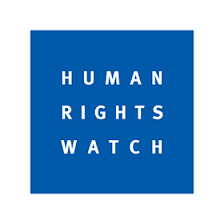World Court to Review 57-Year Israeli Occupation
UNITED NATIONS, 19 Feb 2024
Human Rights Watch - TRANSCEND Media Service

The International Court of Justice in The Hague, Netherlands, August 27, 2018
© 2018 Mike Corder/AP Photo
52 Countries to Take Part in Hearings on Occupied Palestinian Territory
16 Feb 2024 – An unprecedented number of countries and international organizations are expected to participate in the International Court of Justice’s (ICJ) oral hearings on Israel’s occupation beginning February 19, 2024, Human Rights Watch said today. Fifty-two countries and three international organizations will participate in the oral proceedings, more than in any other case since the world’s highest court began functioning in 1946.
The broad participation in the hearings and the many written submissions reflect growing global momentum to address the decades-long failure to ensure respect for international law in the Occupied Palestinian Territory.
“The International Court of Justice is set for the first time to broadly consider the legal consequences of Israel’s nearly six-decades-long occupation and mistreatment of the Palestinian people,” said Clive Baldwin, senior legal adviser at Human Rights Watch. “Governments that are presenting their arguments to the court should seize these landmark hearings to highlight the grave abuses Israeli authorities are committing against Palestinians, including the crimes against humanity of apartheid and persecution.”
The oral proceedings stem from a December 2022 request by the United Nations General Assembly for an advisory opinion by the court on the legal consequences of Israel’s policies and practices in the Occupied Palestinian Territory. The court has the opportunity to address the prolonged occupation, to consider Israel’s practices and policies violating international legal prohibitions against racial discrimination, including the crimes against humanity of apartheid and persecution, and to appraise the legal responsibilities of other countries and the UN to address violations of international law arising from the occupation.
Although ICJ advisory opinions are non-binding, they can carry great moral and legal authority and can ultimately become part of customary international law, which is legally binding on states.
These proceedings, which will last six days, are distinct from the case brought by South Africa to the same court alleging that Israel is violating the Genocide Convention amid the hostilities between Israeli forces and Palestinian armed groups that escalated following the October 7, 2023, Hamas-led attacks.
The General Assembly first asked the ICJ for an advisory opinion related to the Occupied Palestinian Territory in December 2003. In July 2004, the ICJ’s advisory opinion found that the route of Israel’s separation barrier violated international law and that it should be dismantled. The December 2022 request to the court is wider in scope. The General Assembly asked the court to give its opinion on the “legal consequences arising from the ongoing violation by Israel of the right of the Palestinian people to self-determination, from its prolonged occupation, settlement and annexation” of the Occupied Palestinian Territory, including “its adoption of related discriminatory legislation and measures,” and on the legal consequences of the occupation and Israel’s practices for all states and the UN.
The December 2022 request to the court is wider in scope. The General Assembly asked the court to give its opinion on the “legal consequences arising from the ongoing violation by Israel of the right of the Palestinian people to self-determination, from its prolonged occupation, settlement and annexation” of the Occupied Palestinian Territory, including “its adoption of related discriminatory legislation and measures,” and on the legal consequences of the occupation and Israel’s practices for all states and the UN.
The request provides the court the opportunity to evaluate the situation two decades after its last advisory opinion on the Occupied Palestinian Territory and provide guidance on the law, including the continued application of international humanitarian law and human rights law. The court could also assess Israel’s conduct under international human rights law, including prohibitions on racial discrimination, and international criminal law, including the crimes against humanity of apartheid and persecution.
The ICJ adjudicates disputes between states and issues advisory opinions on international law. It lacks jurisdiction over the conduct of non-state armed groups like Hamas. The International Criminal Court (ICC), by contrast, addresses serious international crimes allegedly committed by individuals, including members of armed groups. The ICC prosecutor confirmed that since March 2021 his office has been conducting an investigation into alleged atrocity crimes committed in Gaza and the West Bank since 2014, and that the court has jurisdiction over international crimes committed by all parties in the current hostilities between Israel and Palestinian armed groups.
Human Rights Watch has documented that Israeli authorities are committing the crimes against humanity of apartheid and persecution against Palestinians. Given that the responsibilities of an occupying power toward the rights of the occupied population increase over time, Human Rights Watch has also called for Israel to provide Palestinians in the occupied territory with rights at least equal to those it grants its own citizens, in addition to the protections of international humanitarian law.
The ICJ is composed of 15 judges elected by the UN General Assembly and Security Council for nine-year terms. Fifty-seven states and international organizations had filed a written statement in the proceedings in July 2023, before the October escalation in hostilities. Fifteen states and international organizations filed additional written comments in October and November 2023. Among those participating in the oral proceedings are Palestine, South Africa, Belgium, Brazil, the United States, Russia, France, China, Namibia, Pakistan, Indonesia, the United Kingdom, Switzerland, and the African Union. Israel submitted a written statement and chose not to participate in the oral hearings.
The ICJ will issue its legal opinion at a date to be determined. Past practice suggests that the opinion will be issued before the end of 2024.
Tags: Arms Industry, Arms Trade, Colonialism, Crimes against Humanity, Ethnic Cleansing, Gaza, Genocide, Genocide Convention, Imperialism, International Court of Justice ICJ, Israel, Israeli Apartheid, Justice, Massacre, Palestine, State Terrorism, UK, USA, United Nations, War crimes, Zionism
DISCLAIMER: The statements, views and opinions expressed in pieces republished here are solely those of the authors and do not necessarily represent those of TMS. In accordance with title 17 U.S.C. section 107, this material is distributed without profit to those who have expressed a prior interest in receiving the included information for research and educational purposes. TMS has no affiliation whatsoever with the originator of this article nor is TMS endorsed or sponsored by the originator. “GO TO ORIGINAL” links are provided as a convenience to our readers and allow for verification of authenticity. However, as originating pages are often updated by their originating host sites, the versions posted may not match the versions our readers view when clicking the “GO TO ORIGINAL” links. This site contains copyrighted material the use of which has not always been specifically authorized by the copyright owner. We are making such material available in our efforts to advance understanding of environmental, political, human rights, economic, democracy, scientific, and social justice issues, etc. We believe this constitutes a ‘fair use’ of any such copyrighted material as provided for in section 107 of the US Copyright Law. In accordance with Title 17 U.S.C. Section 107, the material on this site is distributed without profit to those who have expressed a prior interest in receiving the included information for research and educational purposes. For more information go to: http://www.law.cornell.edu/uscode/17/107.shtml. If you wish to use copyrighted material from this site for purposes of your own that go beyond ‘fair use’, you must obtain permission from the copyright owner.